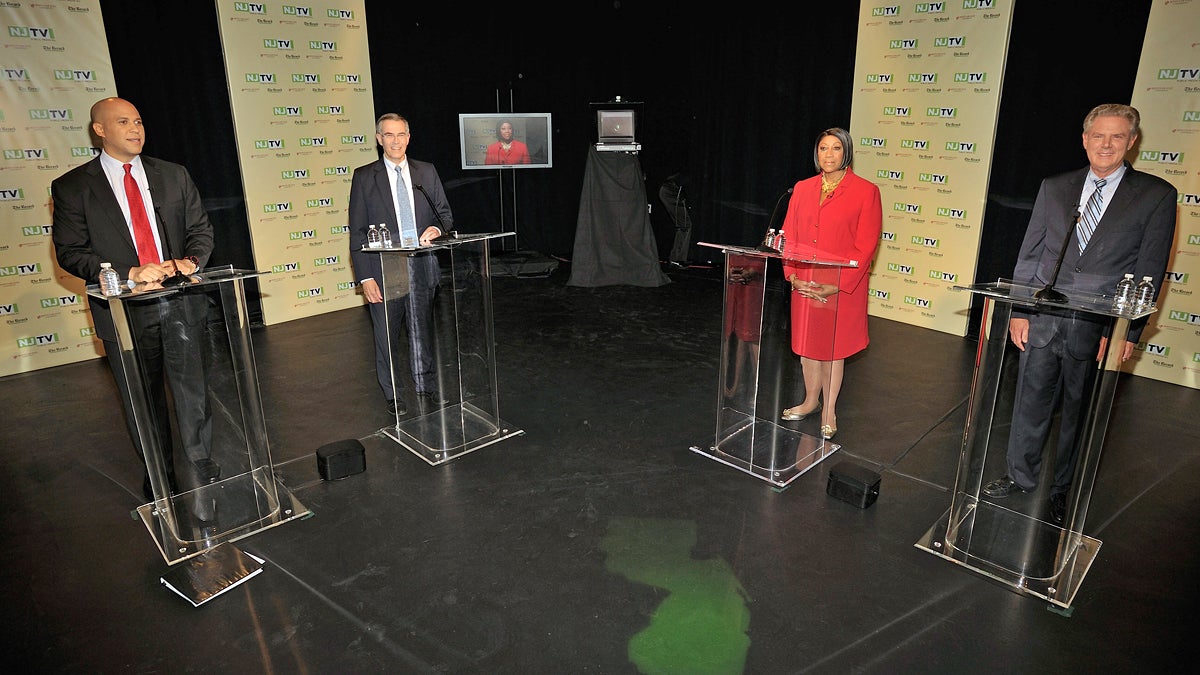Cory Booker’s support for school vouchers hasn’t hurt him yet

Newark Mayor Cory Booker, Rep. Rush Holt, Assembly Speaker Sheila Oliver and Rep. Frank Pallone stand during a camera test before a U.S. Senate Democratic Primary debate televised on NJTV from Montclair State University in Montclair, N.J. on Monday, Aug. 5, 2013. (AP Photo/NJTV, Joseph Sinnott)
This is part of a series from education blogger Laura Waters of NJ Left Behind.
Politico, the widely-read political journalism site, poses this question: “Do any of Cory Booker’s Democratic opponents lay a glove on him before next week’s New Jersey Senate primary?” If the tenor of Monday night’s debate at Monmouth Community College is any indicator, the answer is “no.” That’s not particularly surprising, given that the new Quinnipiac University poll shows Newark Mayor Booker with a strong lead over Frank Pallone, Sheila Oliver and Rush Holt.
Booker’s dominance says more about the leader’s media acuity, charisma, and funding than it does about any weaknesses among the other candidates; after all, on many issues these candidates are politically interchangeable.
Except for one issue: school vouchers, which allow parents to apply a government certificate to a private or parochial school. On Monday night the the Democratic U.S. Senate candidates pounded Booker for his pro-voucher stance, igniting what The Record called “the debate’s only fireworks.”
Vouchers remain a hot-button issue in N.J.: after all, NJEA, the primary teachers’ union that is also a primary funding source for politically-friendly candidates, has mounted a “vigorous campaign” to halt any legislation. And vouchers conflate our tidy sense of the duality of private education and public education.
So it’s a big deal in New Jersey. In the U.S. Senate? Not so much.
Back in voucher-sensitive N.J. on Monday, Booker ran the gauntlet as his debaters seized on the only weapon available. Rush Holt, reports PolitickerNJ, called vouchers “an efficient way of siphoning money away from public schools.” Congressman Pallone also criticized the Newark mayor for his support of vouchers.”
The Record described this as the candidates’ “first real disagreement” with Booker arguing that it was a question of “whether the government should offer poor families vouchers to send their children to private schools.”
NJ Spotlight called the voucher discussion “the closest any [of the non-Booker candidates] came” to putting a speed bump on Booker’s slick trajectory:
Assemblywoman Sheila Oliver’s stance, on the other hand, is as subtle as an iceberg: she’s personally responsible for sinking N.J.’s Opportunity Scholarship Act (a voucher program), because she’s refused to post the bill, one of her prerogatives as Assembly Speaker.
Booker’s stance is simple too: he’s explained that while he once opposed charter schools and vouchers, working and living in inner-city Newark changed him:
“I began to rethink my situation, rethink my philosophy, rethink my views on public education, simply because of the realities I saw around me. Being outcome-focused started to change my view in favor of options like charter schools, contract schools and, yes, vouchers.”
Booker also claimed that both Pallone and Holt supported school vouchers through the D.C. Opportunity Scholarship Act. Is he right? Do Holt and Pallone support vouchers in their roles as national legislators? Well, for the record Holt voted for it and Pallone voted against it, according to govtrack.us.
But even in Holt’s vote in support of it isn’t a slam dunk for Booker. A little history: when the D.C. Opportunity Scholarship Act came up for a vote in September 2004, it was bundled into an enormous bill called the Consolidated Appropriations Act of 2004, a seemingly endless (pork-laden) list of allocations to every division of government.
Read it if you dare: there’s allocations for rural development programs, for a new Pharmaceutical Analysis center in Saint Louis, for a Joint Automated Booking System for the Department of Justice, for funding “to Develop Fishery Products and Research Pertaining to American Fisheries” in Alaska, new laws regarding the provision “of a passport of a U.S. citizen born in Jerusalem.”
And, yes, the Consolidated Appropriations Act of 2004 also includes an authorization for D.C. to run a program that provides poor students “scholarships to pay the tuition, fees, and transportation expenses, if any, to enable them to attend the DC private elementary or secondary school of their choice.” In other words, vouchers.
So how did our U.S. legislators vote? In the U.S. Senate, Jon Corzine and Frank Lautenberg voted for it. In the U.S. House of Representatives, Holt voted for it and a stated earlier Pallone voted against it.
It wasn’t a big deal at the time, a drop in an ocean of legislation. It’s not a big deal now either. Except, perhaps, on Monday night when a trio of desperate candidates tried to ding Booker’s armor. They’ll have to do better than that.
__________________________________________________________
Laura Waters is president of the Lawrence Township School Board in Mercer County. She also writes about New Jersey’s public education on her blog NJ Left Behind. Follow her on Twitter @NJLeftbehind.
WHYY is your source for fact-based, in-depth journalism and information. As a nonprofit organization, we rely on financial support from readers like you. Please give today.




